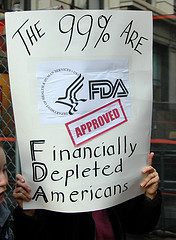Occupy Movement Spin-Off Rolling Jubilee Strikes Debt

The program will “strike debt” by purchasing distressed consumer debt from banks and then abolishing it.
Debt collectors normally buy these distressed debts from the bank in the hopes of making money off them.
The banks have no incentive to keep these debts because they are not making money off them, so they are eager to sell, according to Salon.
The group’s goal is to raise $50,000 which would allow them to buy $1 million worth of debt.
They have raised well over this amount, abolishing over $5 million dollars of debt to date and hope to abolish more.
According to the Federal Reserve, consumer debt in the United States was $2.7 trillion in September.
While $5 million of debt may mean a lot to individuals who are being freed from their debt, it is only about one millionth of a percent of the total private debt in the United States.
According to Mark Moore, an associate professor of economics at the University of Southern California, this program is not nearly large enough to have a significant impact on the economy as a whole. However, there could be a short-term impact on the economy due to a transfer of income.
“Basically the issue is, we are going to have a transfer of wealth somewhere. This [transfer] is more or less, if I donate to them, from me to the person who owed the debt,” Moore said. “What matters is if they are going to spend more money than me, which would be good for the economy in the short run.”
This impact of the program would likely be immeasurable because it is difficult to track the actions of particular individuals.
Moore speculated that it is plausible these people could spend more money after being relieved of their debt, but this is not definite.
The amount of impact this program has will be determined by whether it can gain enough political momentum to change inequality in the United States.
“It is related to a policy issue that could [have a huge impact]: Should the government be helping people with underwater mortgages, ” said Moore. “This would be a bigger potential pool of money and size of money.”
The main way the Occupy movement incited change was by influencing public and political discourse, according to Huffington Post blogger Lisa Kaas Boyle.
“Apart from the individual, it’s not a big effect on the economy as a whole,” said Moore.
Reach Staff Reporter Anna Catherine Brigida here.



